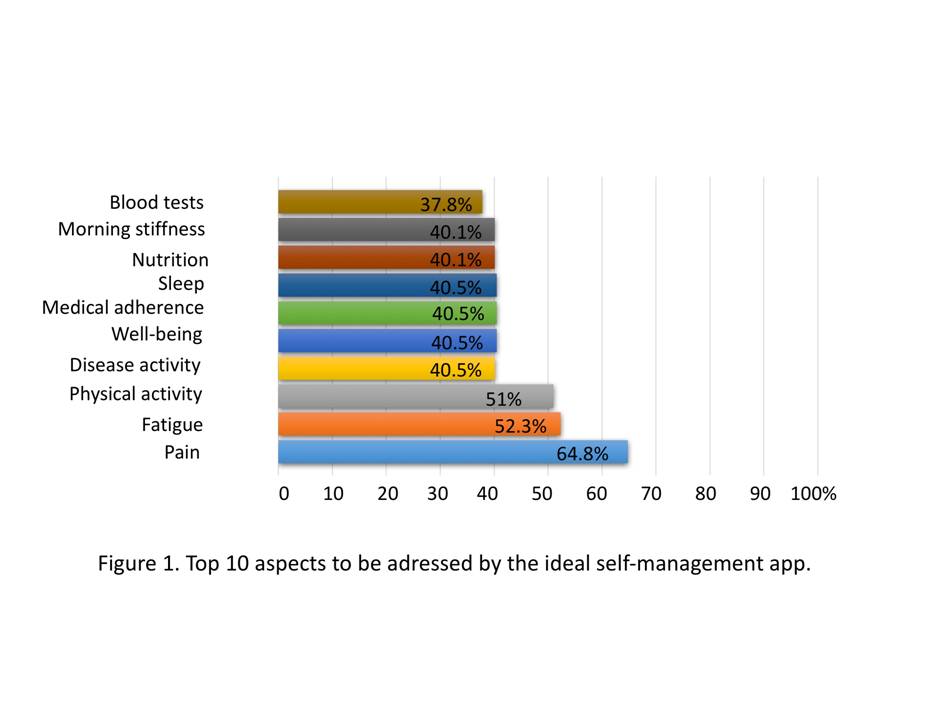Session Information
Date: Tuesday, October 23, 2018
Title: Patient Outcomes, Preferences, and Attitudes Poster II: Patient Perspectives
Session Type: ACR Poster Session C
Session Time: 9:00AM-11:00AM
Background/Purpose: While the increasing availability of apps may enable people with rheumatic and musculoskeletal diseases (RMDs) to better self-manage their health, evidence on the development and evaluation of apps for patients that fulfill quality requirements for their implementation as part of routine care is lacking.
This work aims to explore the needs, experiences and views of people with RMDs about mHealth apps, seeking to obtain direct patient feedback on preferences for components, content and structure of mHealth apps for self-management of their conditions.
Methods: This was a mixed methods study starting with an initial qualitative phase involving a patient focus group (UK). The latter was followed by a survey based on the key themes emerging from this focus group. The survey validation involved a pre-survey test round based on 5 patients (UK, Slovakia, Germany, The Netherlands, Cyprus). Feedback was collected during the test phase and used to improve the survey. Survey was disseminated through patient associations across EU, USA, Canada and Australia.
Results: The focus group included 6 rheumatoid arthritis (RA) patients. Half of them had used a self-management app at least once. The use of existing apps was reported as time consuming and not always usefuldue to lack of functionality, with the need for more tailored apps expressed by all patients. Survey participants: 304 patients across European countries, USA, Canada and Australia. Main age category was 45-54 years (25.7%), 78% were women.
Patients were diagnosed mostly with RA (n=115, 37.8%), psoriatic arthritis (n=53, 17.4%), ankylosing spondylitis (n=47, 15.5%), fibromyalgia (n=43, 14.1%), osteoarthritis (n=41, 13.5%).
Most patients(n=141, 46.7%) had been diagnosed for over 10 years.
Most were using a smartphone (n=261, 85.9%); 20.7% (n=63) were using a mHealth Apps.
71% (n=218) agreed that such Apps could make clinic visits more efficient. Patients were mostly interested in an app enabling self-monitoring of health parameters (58.6%), disease activity (51.3%), lifestyle (40.7%); communication with their health care providers (43.4%) and dealing with medication side effects (40.1%).
The top ten aspects to be addressed by an ideal App are detailed in Figure 1.
Collection of anonymized health data for research purposes is mostly accepted by the patients (57.9%, n=176).
Conclusion: Patients considered that the use of an App tailored for disease self-management and developed in close collaboration with them could benefit their health. The development of such Apps will require standardization and quality check processes. This work will be used as a background for developing future EULAR points to consider for the development, evaluation and implementation of mobile health applications for self-management in patients with rheumatic diseases.
To cite this abstract in AMA style:
Najm A, Nikiphorou E, Lempp H, Gossec L, Berenbaum F. Needs, Experiences and Views of People with Rheumatic and Musculoskeletal Diseases about Self-Management Mobile Health Apps: Results of a Mixed Methods Approach [abstract]. Arthritis Rheumatol. 2018; 70 (suppl 9). https://acrabstracts.org/abstract/needs-experiences-and-views-of-people-with-rheumatic-and-musculoskeletal-diseases-about-self-management-mobile-health-apps-results-of-a-mixed-methods-approach/. Accessed .« Back to 2018 ACR/ARHP Annual Meeting
ACR Meeting Abstracts - https://acrabstracts.org/abstract/needs-experiences-and-views-of-people-with-rheumatic-and-musculoskeletal-diseases-about-self-management-mobile-health-apps-results-of-a-mixed-methods-approach/

